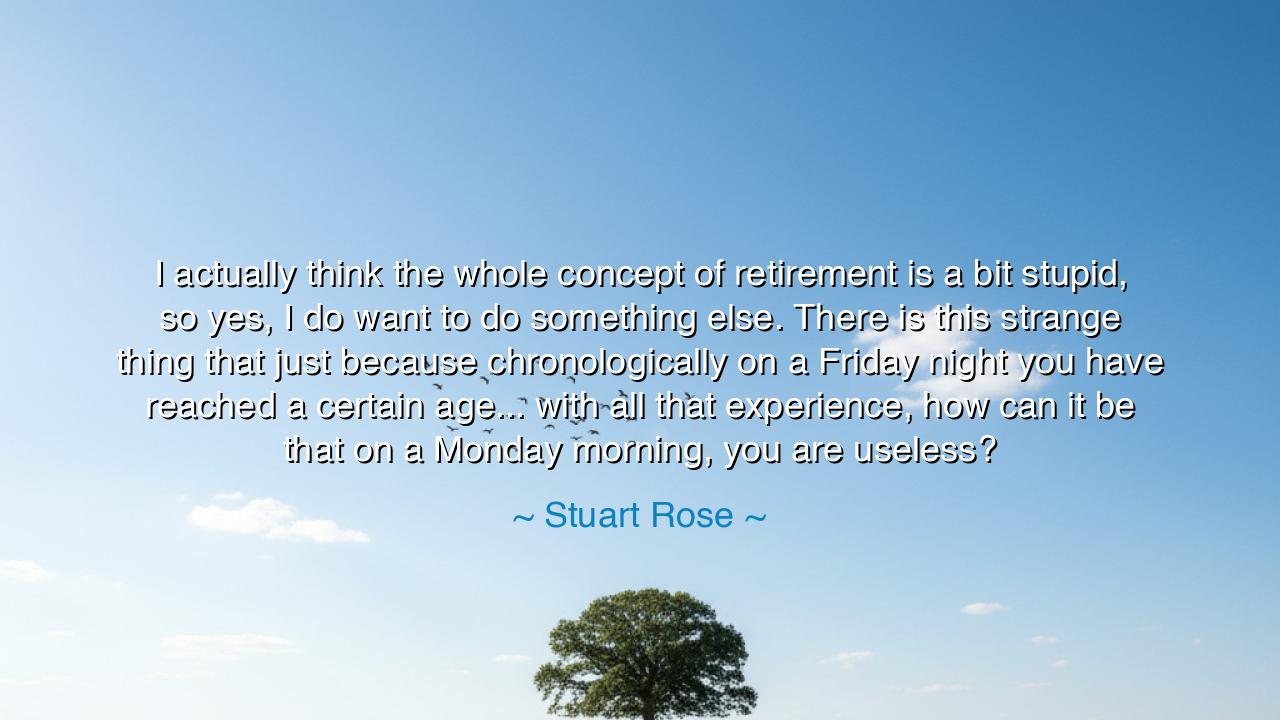
I actually think the whole concept of retirement is a bit
I actually think the whole concept of retirement is a bit stupid, so yes, I do want to do something else. There is this strange thing that just because chronologically on a Friday night you have reached a certain age... with all that experience, how can it be that on a Monday morning, you are useless?






The words of Stuart Rose fall upon the ear with both fire and reason: “I actually think the whole concept of retirement is a bit stupid, so yes, I do want to do something else. There is this strange thing that just because chronologically on a Friday night you have reached a certain age... with all that experience, how can it be that on a Monday morning, you are useless?” In this reflection, we find a challenge to one of society’s most unquestioned customs: the belief that a certain number of years lived should mark the end of one’s usefulness. Rose sees this not as wisdom, but as folly, for the spirit of man does not wither in a moment of time, and the wealth of experience is not made worthless by the passing of a single dawn.
In the ancient world, no such rigid idea of retirement existed. The elders were the counselors of kings, the teachers of youth, the guardians of tradition. The age-worn were revered not for their diminished strength, but for their accumulated wisdom. In Sparta, warriors too old for battle were entrusted with guiding the state. In Rome, the Senate—named for the senex, the old man—was the very heart of governance, for it was believed that experience, not youth, preserved the Republic. Rose speaks in the echo of these ancient voices, reminding us that to cast aside the elder as “useless” is to sever ourselves from our richest source of insight.
Think of the life of Michelangelo, who, long after others might have laid down their tools, sculpted the Rondanini Pietà in his late eighties. His hand trembled, his body was frail, yet his spirit remained aflame. Or of Winston Churchill, who in the twilight of age returned to lead his people through the fire of war. Were these men useless on a Monday morning simply because a calendar declared them so? No—they were proof that the human soul cannot be bound by arbitrary timetables.
Rose’s words reveal a deeper injustice: that modern society, in worshiping youth, often discards those who bear the marks of long struggle and deep understanding. Yet to discard the elder is to discard wisdom hard-won in the furnace of years. A culture that silences its aged voices is like a tree that cuts off its own roots. The experience of decades cannot be replicated by any quick training or youthful vigor; it is the gold refined slowly, the treasure gathered across storms and seasons.
The lesson, then, is to resist the lie that your value ends at a certain age. Do not allow the world to declare you useless when your heart still yearns to labor, to teach, to create, to guide. Each morning you rise, you carry with you the harvest of years—insight, resilience, memory, perspective. If strength fails, let wisdom lead. If swiftness falters, let endurance shine. Life itself is a continuum, and its worth does not vanish because a page on the calendar has turned.
Practically, this means seeking purpose beyond the dictates of convention. If your work ends, begin another. If your role changes, find new ways to serve. Teach, mentor, write, volunteer, or create—whatever keeps the flame of your spirit alive. Do not think of the so-called retirement as an end, but as a season for transformation. The Monday morning after your supposed ending may, in truth, be the dawn of your greatest work.
So let Stuart Rose’s challenge stand as a teaching for future generations: measure not a life by its years but by its contributions, not by the fading of strength but by the richness of wisdom. The passing of time does not make a man or woman useless; it makes them a vessel of treasures the world cannot afford to lose. Let us therefore cast aside the folly of forced endings, and honor the truth that as long as breath remains, so too does purpose.
For in the end, to live is to grow, to labor, and to serve, not until a clock strikes on a Friday night, but until the last light of the soul departs. This is the wisdom of the ancients, and this is the call of Rose: to awaken each day, whatever our age, knowing that we are still needed, still worthy, still alive with purpose.






AAdministratorAdministrator
Welcome, honored guests. Please leave a comment, we will respond soon